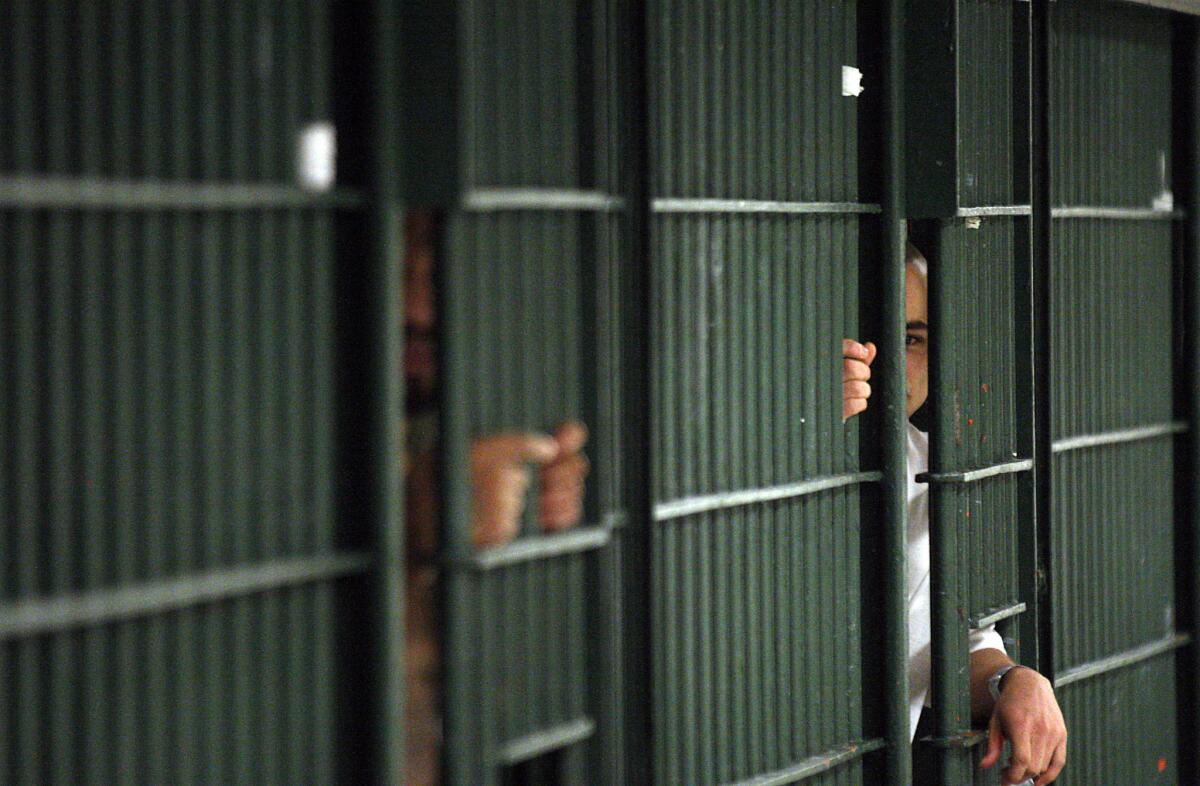Judge declares mistrial in case of deputy linked to jail probe

- Share via
The trial of a sheriff’s deputy accused of obstructing a federal investigation into Los Angeles County jails ended Thursday with a hung jury.
After two days of deliberations, the jury could not agree on whether to convict James Sexton, 29, for what prosecutors said was his role in hiding an inmate informant from FBI agents.
The mistrial comes as a second trial gets underway involving six L.A. County Sheriff’s Department officials who prosecutors say were part of the plan to move the inmate from jail to jail under various aliases.
Jurors in the Sexton trial signaled early on that they had reached an impasse, sending U.S. District Judge Percy Anderson a note on Wednesday morning, a day after closing arguments.
Anderson asked them to take more time, sending them out to lunch to “clear their heads,” then adjourning the day’s session early after they still could not agree.
In addition to the remaining obstruction cases, federal prosecutors are moving forward with about a dozen other cases stemming from the jail investigation. Some involve what authorities say are instances of brutality against inmates and visitors.
The Sheriff’s Department officials who have been charged are all relatively low-ranking. Investigators are still considering whether any of the department’s top brass should face criminal charges.
At his trial, Sexton’s attorneys attempted to show that their client was merely following orders from his superiors, calling then-undersheriff Paul Tanaka to the witness stand. During cross-examination, a prosecutor revealed that Tanaka, who is running for sheriff, is the subject of an ongoing federal investigation.
The weeklong trial centered around the events of August and September of 2011, when Sheriff’s Department officials discovered that Anthony Brown, an inmate at Men’s Central Jail, had a cellphone that had been smuggled in by federal agents. The agents hoped Brown would document deputies bringing in contraband and assaulting inmates.
Sexton did not testify, but his grand jury testimony was read in court. Jurors heard him detail the elaborate steps he and others took to keep Brown away from the “adversary” -- that is, the U.S. government and the FBI.
After deputies realized Brown had been in contact with the FBI, Sexton said, the inmate was marked as released within the department’s tracking system, then rebooked every 48 hours under a new fake name, crime and physical description.
“Defendant Sexton was the one with the knowledge to move Anthony Brown,” Asst. U.S. Atty. Margaret Carter argued to jurors. “All that mattered was hiding him from the FBI.”
Prosecutors pointed to the timing of Brown’s transfers as proof that deputies were working to thwart federal authorities, noting that Brown was only moved after FBI agents came to the jail to interview him.
Sexton’s defense team, which included former U.S. Atty. Thomas O’Brien, emphasized just how low the deputy fell in the department’s hierarchy. Former sheriff Lee Baca and his second-in-command, Tanaka, were frequently mentioned as giving tacit approval to the steps taken by Sexton and others.
Tanaka and Capt. William “Tom” Carey each testified that deputies were not obstructing the federal investigation, and that the inmate was moved for his safety. Each man acknowledged under cross-examination that he is a subject of an ongoing grand jury investigation.
“He’s receiving these orders -- he’s sure as heck not giving them,” O’Brien said of Sexton, noting that his client had been on the job only three years at the time of the Brown incident. “Undersheriff Tanaka and Captain Carey don’t even know this guy. ... The people giving the orders here haven’t been indicted.”
O’Brien downplayed Sexton’s statements to the grand jury, saying the deputy was “puffing himself up” in his eagerness to help federal authorities. Sexton testified twice before the grand jury and gave more than 30 statements to federal investigators.
Sexton was “collateral damage” of a jurisdictional battle between the FBI and the Sheriff’s Department, O’Brien said: “This is a case of who’s got the biggest badge, and the government has overreached.”
Sexton is still employed by the department but was “relieved of duty” last December, shortly before his indictment was announced.
More to Read
Sign up for Essential California
The most important California stories and recommendations in your inbox every morning.
You may occasionally receive promotional content from the Los Angeles Times.












